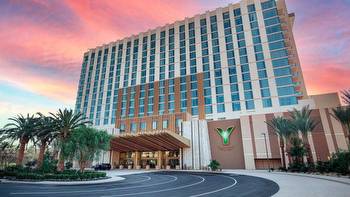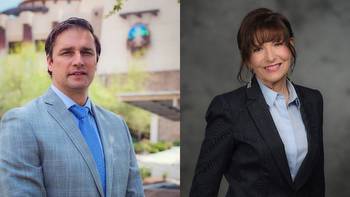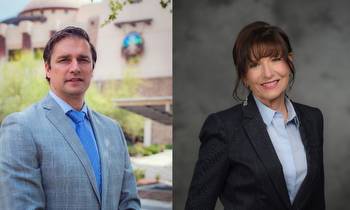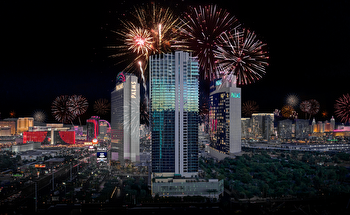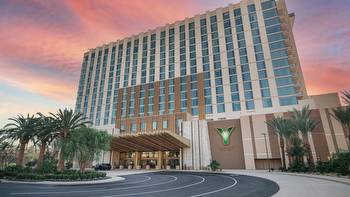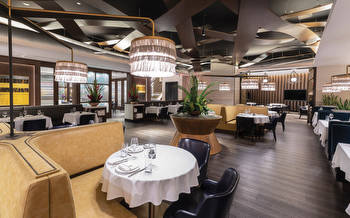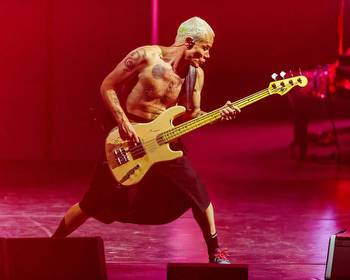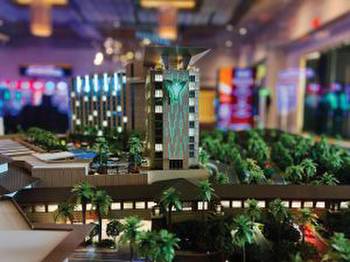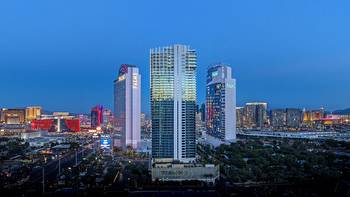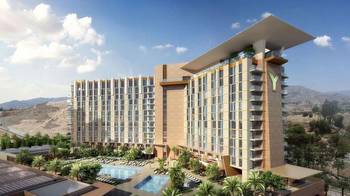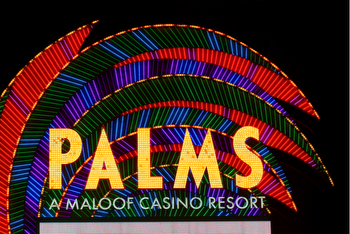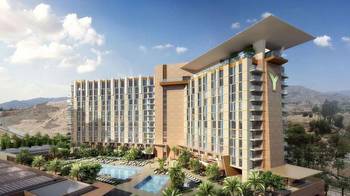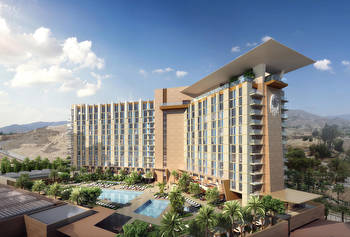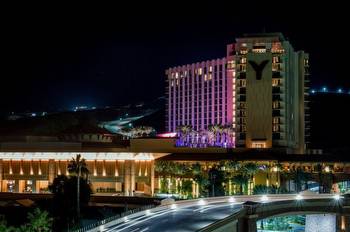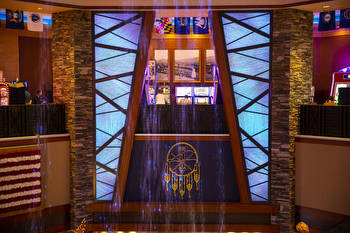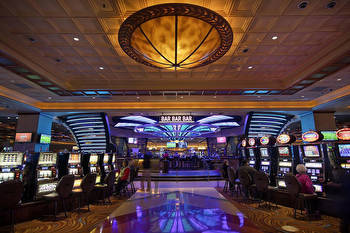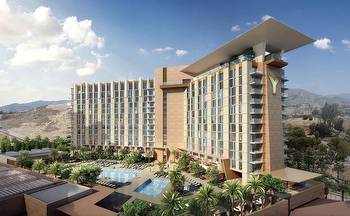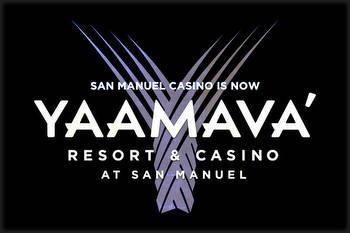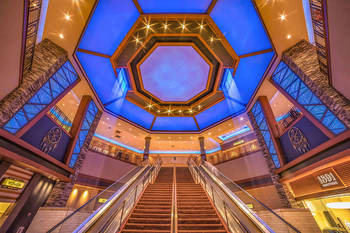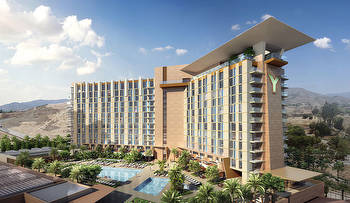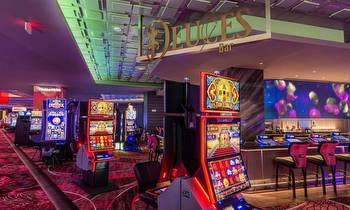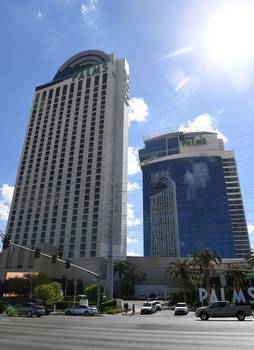San Manuel Casino rebrands as Yaamava’ Resort & Casino at San Manuel

Hello, Yaamava’ Resort & Casino at San Manuel.
The San Manuel Band of Mission Indians is changing the name of its Highland area casino ahead of the December debut of its new luxury hotel and resort, tribal officials announced Friday, Sept. 24.
“Yaamava’ is a native Serrano word which means spring, a time for growth and rebirth,” Afsi Bird, vice president of hotel operations, said in a telephone interview, “and like any transformation, this change is very important to the tribe, and it’s really a great milestone for them to have this beautiful luxury resort in the making for the past three years.”
Yaamava’ “matches the birth of this new building, the birth of this new endeavor,” Bird said. “A new beginning.”
The tribe began its gaming operations in 1986 and as it expanded became known as San Manuel Indian Bingo and Casino before shortening its name to San Manuel Casino in recent years.
Laurens Vosloo, CEO of the San Manuel Band of Mission Indians, wrote in an email Thursday, Sept. 23, that the forthcoming opening of the hotel and entertainment center “represent probably the most transformational of efforts — as the property transitions from a regional casino into a full-blown resort.
“The significance of these physical changes gave the Tribe the opportunity to determine if it was the right time to rethink the casino’s identity,” he said. “And for them it was.”
Vosloo added: “It’s not usually a clear-cut decision to sunset one brand and introduce another, especially when the original has a strong reputation and so much heritage. But it was so important to the Tribe to be able to honor their ancestral lands and culture.
“Ultimately their values led them to this decision.”
Kate Spilde, chair of the Sycuan Institute on Tribal Gaming at San Diego State University, said renaming a destination spot with 35 years of brand equity is an example of the Serrano tribe “bringing their culture and language forward and emphasizing the ‘tribal’ in tribal gaming and really establishing and reminding guests that this is tribal land.”
“How are the gaming revenues, the gaming facilities, the gaming employment really enhancing the tribal community and the region and the community around the tribe? It’s a very different way of understanding gaming and welcoming guests,” Spilde said.
“This isn’t welcoming guests to a business, this is welcoming guests to tribal homeland.”
The rebrand in San Bernardino County includes a new visual identity and logo inspired by the ancestral lands of the Serrano people, tribal officials said in a statement about the new branding.
With yucca plant fronds forming a ‘Y’ in a woven basket pattern, the Yaamava’ logo symbolizes the San Manuel band’s local history while paying homage to its culture and heritage.
As the rebrand pertains to the tribe’s sports, stadium and arena partners, where visitors saw San Manuel Casino before, they now will see Yaamava’ Resort & Casino at San Manuel, Vosloo said. San Manuel Band of Mission Indians may also be used in place of San Manuel Casino.
A major rebrand like this will take time, Vosloo said.
“We have already begun changing signage over and aim to have it completed in the next few weeks,” he added. “That said, we are pretty realistic in understanding that a lot of people who have been part of San Manuel Casino’s journey may keep calling by its old name for a while.”
There are no plans to change the name of the restaurants or other venues, Vosloo said.
The casino, operated by the tribe’s San Manuel Entertainment Authority, has evolved over the last 35 years. After the original bingo hall opened in 1986, a floor for card games and 300 slot machines was added in 1994, followed by an addition in 2001 that boosted the number of slot machines into the thousands.
The existing casino opened in 2005 with gaming space, restaurants, a parking garage and a bingo hall that served as the property’s entertainment venue, attracting artists as diverse as Gloria Estefan, Kiss, Little Richard, Joan Rivers, Paquita la del Barrio and Drake. The casino ultimately closed the bingo hall and transformed the space into the Rockin’ Casino, which was completed in November 2017 and features a number of music-themed slot machines, as well as eateries such as Rock & Brews and George Lopez’s Chingon Kitchen.
And as the property grew, so did San Manuel Casino’s branding identity, which can be seen in prominent places around Southern California, from multiple placements in Dodger Stadium to billboards along the region’s busy freeways. In addition to sponsoring most professional sports teams in Southern California, San Manuel Casino has also partnered with professional sports teams in Nevada, including the Las Vegas Raiders and the Golden Knights.
But branding is more than business, Spilde said.
“Tribes, like all businesses, must consider return on investment, but more than that, tribes have an additional metric that’s just as important to them: return on community,” she said.
Growth in Southern California and beyond
The resort’s $760 million expansion began in July 2018, but the coronavirus pandemic delayed construction. In recent months, the tribe unveiled the first phase of the complex’s expansion, including more gaming space, multiple new high-limit rooms, the Serrano Vista Café, three bars and new shops.
The next phase includes the 17-floor hotel, expected to open in December, which will have 432 guest rooms, including 127 suites, a spa and a pool area, among other amenities.
And in early 2022, a 2,800-seat entertainment venue will open to the public.
Renaming the Highland property was discussed as early as 2018, when San Manuel tribal leaders broke ground on the new hotel and resort, said Jenna Brady, a tribe spokeswoman. With the San Manuel Band of Mission Indians expected to close on the Palms Casino Resort in Las Vegas by the end of the year, rebranding its anchor casino in Southern California allows the tribe to lend the San Manuel name to other business ventures, Brady added.
By the end of 2021, the San Manuel tribe said it will employ more than 6,000 people.
The tribe’s expansion of its casino footprint followed a number of other tribal casinos growing in the region in recent years.
The new Agua Caliente Casino Cathedral City opened in November 2020; Soboba Casino Resort’s new casino and hotel opened in the San Jacinto area in February 2019; and Pechanga Resort & Casino’s expansion — including a second hotel tower, new event space and a pool complex — was completed in March 2018.
Additionally, the casino’s website is changing to yaamava.com and will have social media handles with the new name.
“Yaamava’ should convey the Tribe’s affirmative commitment to preserving and advancing their native culture,” Vosloo said. “Moreover, in upcoming advertising campaigns – which really will begin to introduce the new brand later this year – we will begin to peel back the layers of Yaamava’ and its possibilities.”








